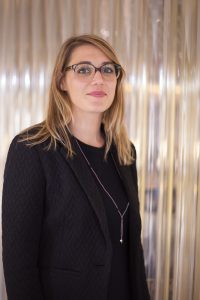 Equilibres & Populations, a French NGO working for the promotion of sexual and reproductive health and rights, is leading a specific project on female genital/sexual* mutilation in Mali: “Protecting the Next Generation “. Aurélie Désrumaux, project manager at EquiPop since 2010, is in charge of this project and has agreed to tell us about the NGOs work with the Malian community in Mali and France.
Equilibres & Populations, a French NGO working for the promotion of sexual and reproductive health and rights, is leading a specific project on female genital/sexual* mutilation in Mali: “Protecting the Next Generation “. Aurélie Désrumaux, project manager at EquiPop since 2010, is in charge of this project and has agreed to tell us about the NGOs work with the Malian community in Mali and France.
* In France agents working in the field of female genital mutilation (FGM / MGF) prefer to use the term “sexual” to show that the practice has more global consequences on the genitalia and sexuality of women.
Could you tell me about Equilibres & Populations?
« It’s a French non-governmental organisation (NGO), initially created by doctors and journalists in 1994 in the wake of the Cairo International Conference on Population and Development. The initial purpose of the organisation was to carry out advocacy withFrench decision-makers on the importance of sexual and reproductive health and rights, particularly in sub-Saharan Africa. Over time, EquiPop has grown and has started coordinating and supporting field projects.
Equilibres & Populations aims to improve the health and status of women and girls in Francophone sub-Saharan Africa on a sustainable basis, with a focus on vulnerable adolescent girls. To do this, we are developing actions around a triple strategy: Rally (people, decision-makers, technical and financial partners), Drive (dynamics of change), Accompany (the populations with whom we work in the definition of projects which aims to improve their well-being, Training of key agents …) »
Today, EquiPop is active in several projects in West Africa: Mali, Benin, Burkina Faso, Niger, Togo, Côte d’Ivoire, and has a representative office in Burkina Faso.
Can you tell us about yourself, how did you start to work on reproductive and sexual health issues? 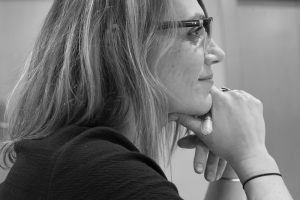 « I don’t think it was by accident, they are issues that have aroused a great interest in me for a very long time and about which I have always had many questions.
« I don’t think it was by accident, they are issues that have aroused a great interest in me for a very long time and about which I have always had many questions.
Over time, I realised that there were differences between girls and boys, especially in relation to expectations, what society allowed us or not, how we were oriented … I wanted to dig deeper into these social issues and once I returned to University, in political sciences, I steered towards the problems of development, gender, equality, etc. »
It was during a study course in a Senegalese NGO working on maternal and child health that Aurélie actually realised that health is not a given right for everyone. In 2008 she started at Equilibria & Populations, first at the office in Ouagadougou (Burkina Faso) West Africa, then in the Paris headquarters.
Protect the next generation form excision in Mali and France
Since 2006 Equilibres & Populations leads a project to promote the abandonment of FGM in the region of Kayes, in Mali, titled “Protect the Next Generation”.
« I was aware of the practice of FGM and its consequences, but had not really delved into the subject. It was by starting work on this project that I realised the magnitude of the phenomenon and the multiple consequences on the health of women and girls. Female genital mutilation is a gender-based violence and is part of the continuum of violence perpetrated against women solely because they are women. For me it is essential to capitalise on the experiences, to reflect together on how to achieve sustainable abandonment of FGM. »
To carry out this project, Equi&Pop created a partnership with a Malian association, AMSOPT, which has 15 people employed on this project in Kayes, Mali. The Kayes Health District is composed of250 villages where 95% of women have undergone FGM. Different types of excision are found: types 1 (clitoridectomy) and 2 (excision), but also infibulation, not by stitching but by joining the lips during healing because in some communities the legs of girls are tied together after excision.
« This project develops continuously. In 2006 we started with a few villages and little by little we have increased the number of villages affected by the project. Today we lead awareness-raising activities in 150 villages. Through the production and broadcasting of programmes on community radio stations, which are widely popular, we can finally reach throughout the region of Kayes, and beyond. Inter-village meetings between committed villages are also held. Some villages have taken position in favour of abandonment, have signed a Charter and took an official position as part of ceremonies of abandonment. We have other villages where positions are more mixed and a very small minority who are obstinate. »
« Protect the Next Generation » is an integrated and holistic project.
The goal is sustainability of the abandonment of FGM in the villages.
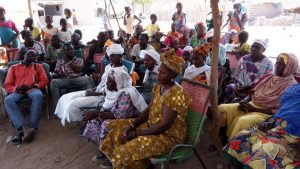
Village meeting in Kayes
« We don’t talk about FGM directly, we pass by other issues concerning sexual and reproductive health, pregnancy, pathologies related to the pregnancy, malaria, hygiene… until the communities themselves define FGM as a problem. It’s at this moment that we address FGM and other gender-based violence, issues related to the respect for human rights, etc… Thus, about 60 villages who are committed to the abandonment of circumcision also pledged against child marriage!
« There is a very important bond of trust between AMSOPT and villages, the organisation is highly respected. But it was not always easy for the animators. Sometimes they have been insulted or even had rocks thrown at them! They are very courageous. »
To spread the abandonment of FGM process in the project zone, EquiPop has also implemented exchanges between the committed villages and villages that are more resistant or who are not yet in the project area. The results of these exchanges are very positive.
Building bridges with the Malian diaspora in France
Kayes is a major emigration region. That’s why, since 2009, EquiPop has implemented a ‘migration’ component in order to work with the Malian diaspora in France. In the Paris region the community from Kayes is very well organised and structured according to the villages of origin. The NGO based itself on this network to develop actions, in partnership with migrant organisations.
« We started to work with the Malian diaspora because we realised that they had an important socio-economic power in the villages of origin in Kayes. Some members of the diaspora in France were opposed to the idea that villages in Kayes are abandonning excision. In 2009 several villages which were said to oppose FGM finally retracted because of this… In addition, we knew that girls of Malian origin living in France could be sent to the villages to be circumcised there. »
«There was also a lack of information between the diaspora and the villages of origin. The message had to be passed to members of the diaspora that things are changing in their villages of origin, standards change, FGM is being abandoned. This allows them to get a better understanding of the change, to accompany and exchange experiences on these issues with their communities. The aim was to make sure that the members of the diaspora would not feel betrayed, and that they wouldn’t find themselves in a tense situation or see their identity as dependent on customs that no longer take place in the villages »
The migrant component also enabled to give the floor to the migrants who are against the practice (and there are many!) and to give a voice to women who have fled their country because of the FGM.
Thanks to the bridges created between the diaspora and the villages we could thwart some risks of excision of young girls arriving in the villages to undergo FGM. The work between diaspora and villages is mutually beneficial.
Training Course for Peer educators
Within the project, EquiPop trains Peer Educators from the Malian diaspora living in France, who want to engage against FGM in their communities. These women and men are trained in communication skills and gain knowledge on FGM, gender-based violence, etc.
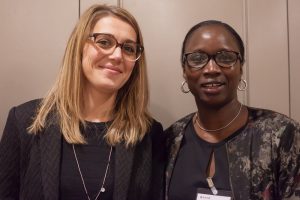
Aurélie and her colleague Sokhna Fall Ba, responsible for the mobilisation of the diaspora
« Of the dozen or so men and women trained all have had a dramatic personal experience concerning FGM: for women who are themselves survivors or for their loved ones. We had cases of women who arrived from Mali, who have been married and where the husband thought they were not sufficiently circumcised, and have undergone the practice again in France… This isn’t a majority, but it happens. »
In 2009, EquiPop organised a trip to Mali with a group of migrant peer educators, for an abandonment ceremony. Because of the security situation in Kayes, the NGO has unfortunately no longer been able to send peer educators there afterwards. Therefore, communication between the two groups is achieved through taped messages and radio broadcasts. Today EquiPop also conducts other training projects for individuals from the African diaspora, to strengthen the work with migrant communities living in France.
New projects to build bridges between the diaspora and communities of origin
Equilibres & Populations are currently working on a new project, “Building bridges between Africa and Europe to end FGM”, funded by the joint programme of UNICEF and UNFPA (the United Nations Population Fund) on FGM, in partnership with GAMS Belgium and the Italian association AIDOS. The purpose of this project is to facilitate the exchange between participants in Europe and Africa through the Communities of Practice (COP) website, the production of a documentary, video recordings by young people…
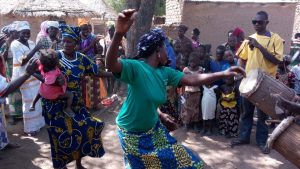
Meeting with villagers in Kayes
« One of the main challenges is to find funds that allow to build bridges between communities in Africa and in Europe because funding is highly compartmentalised. We manage to finance activities in Europe, or in Africa, but activities that link the two, it’s really hard …
However, I am convinced that to reach sustainable abandonment of FGM, it’s crucial to facilitate the exchange of experiences and good practices, beyond borders, between associations who campaign in Africa and those who campaign in Europe…»
More information at:
